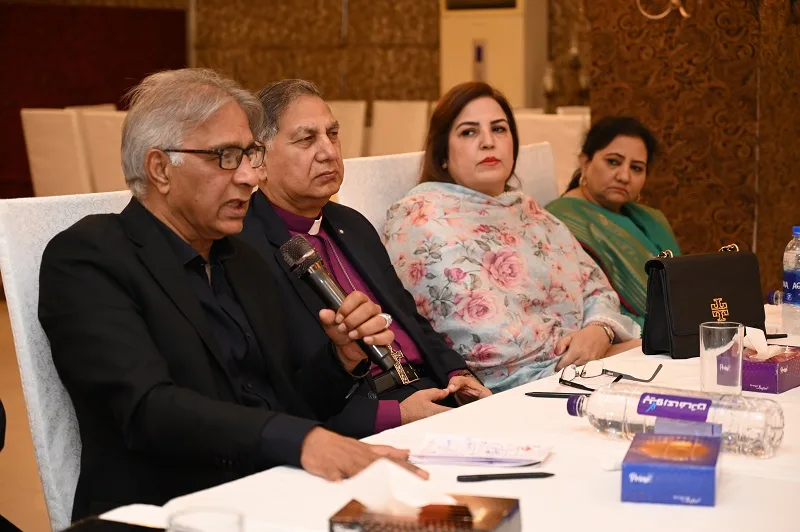PESHAWAR, Pakistan: The Centre for Social Justice (CSJ) organized a Conference in Peshawar on “Strengthening Democracy: Delivering on Pledges regarding human rights” wherein human rights defenders and representatives from political parties emphasized that the government needs to make concerted efforts to curb religious intolerance and introduce substantial measures to uphold equality of rights and citizenship.
The CSJ Executive Director Peter Jacob, Awami National Party’s (ANP) representative Dr. Khadim Hussain, Bishop Earnest Jacob, former Minister of Social Welfare Aasiya Jehangir, former Pakistan Tehreek-e-Insaf’s (PTI) MPA Wazir Zada, Pakistan Peoples Party’s (PPP) Dr. Sawera Parkash, Qaumi Wattan Party’s (QWP) representative Shakeel Waheed Ullah, Mehmood Jan Babar, Journalist Muhammad Faheem, PTI‘s representative Dr. Nadeem, Suneel Malik, Augustine Jacob and Nasir William were among the speakers.
Speaking on the occasion, Peter Jacob emphasized the critical need for the government to refrain from surrendering power to groups that religion for political gains, which hampers progressive reforms vital for addressing underlying socio-political and economic challenges. He stressed that discrimination rooted in religion fuels hatred and violence against minority groups, with perpetrators often misinterpreting the religion to justify hate crimes. He underscored that the establishment of an inquiry commission is imperative to identify factors and hold those actors accountable for inciting violence and misusing blasphemy laws.
Peter Jacob stressed substantial legal reforms, particularly including in the preamble of the constitution of Pakistan the Quaid-e-Azam Muhammad Ali Jinnah’s first address of 11 August 1947 to the first constituent assembly as a guiding beacon towards addressing marginalization, and enabling structural and systemic inclusion of citizens, and inculcating standards of justice and equality in the governance, which would ultimately take the country to the right direction.
Dr. Khadim Hussain highlighted systemic barriers hindering the equality of human rights for citizens including disparities in citizenship status, unequal distribution of resource allocation, poor governance, terrorism, and religious intolerance. He highlighted that the entrenched discrimination within governance structures perpetuates divisive attitudes based on religious, ethnic, racial, linguistic, and gender identities.
Bishop Earnest Jacob underscored that the political parties ought to prioritize fulfilling their pledges to the electorate made in the election manifesto, and take concrete actions to address human rights issues religious minorities face.
Dr. Sawera Parkash encouraged citizens to collectively raise their voices against human rights violations targeting minorities. She emphasized that legislators are responsible for effectively representing the concerns of citizens within legislative assemblies and party platforms to address human rights issues.
Wazir Zada voiced support for substantial demands including; a law to end child marriage and forced faith conversions, the constitution of a statutory National Commission for minorities’ Rights, and the adoption of rules facilitating jail remission for minority prisoners for studying their religion, which would improve implementation of human rights of minorities.
Shakeel Waheed Ullah reiterated that religious minorities are equal in rights and dignity, and stressed the need for sincere efforts to ensure fair treatment and opportunities for all citizens without discrimination.
Muhammad Faheem stressed the need for minorities to assert their political influence to prevent continued neglect in decision-making processes. He urged political parties to create opportunities for better inclusion and mainstreaming of minorities, which would contribute to advancing democracy and human rights in the country.
Mehmood Jan Babar said that citizens are divided based on diverse identities and the groups who wield religion for political gains, exploit communities. Therefore, citizens need to challenge narratives promoting intolerance, which is crucial to fortify the social fabric.
Suneel Malik emphasized the collective responsibility to uphold principles of equality, justice, and inclusion for all citizens. He said that the democratic process encourages active citizenship to improve inclusive governance, therefore, the concerned stakeholders must remind political parties of their performance against electoral pledges to make them accountable and persuade political representatives to introduce progressive policy reforms to address outstanding human rights issues.
Nasir William called upon political parties in power in the federal capital and provinces to fulfill their pledges particularly the implementing Jillani’s judgment regarding minorities’ rights which has the potential to contribute to fostering social cohesion, inclusion, and fair representation.
